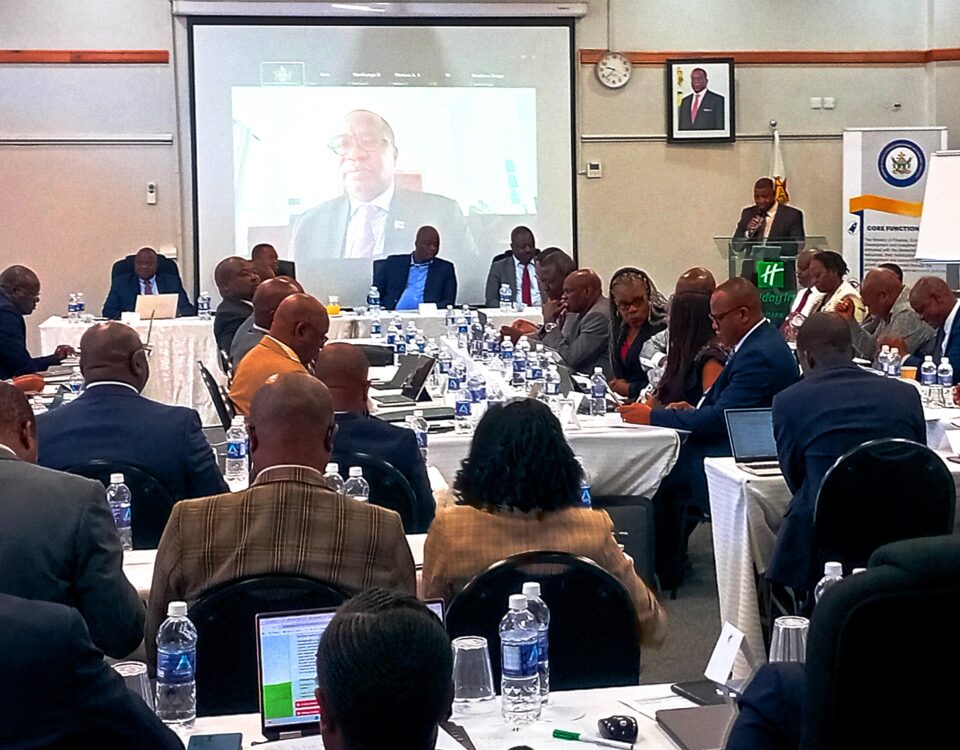
Muzorewa has big shoes to fill, believes UANC is the future for a prosperous Zimbabwe
August 4, 2023
Church leaders must be apolitical during elections: Bishop Muparutsa
August 21, 2023The die has been cast for Chamisa vs Mnangagwa presidency showdown

Citizens for Coalition Change (CCC) supporters singing during the party's last star rally in Mutare which was held recently on August 6 at Sakubva Sports Oval. The ground was filled to the brim.
… Chamisa, Mnangagwa both express confidence of imminent victories
Ngoni Dapira
THE die has been cast as 23 August is now beckoning with five (5) days to go. Tempers and mixed emotions are rising as the days draw closer to D-Day. The heavyweight title showdown to win the Zimbabwean presidency is now clearly ‘anticipated’ to be between the incumbent President Emmerson Mnangagwa from the ruling Zanu-PF party and Nelson Chamisa from the new kid on the block political party Citizens for Coalition Change (CCC), according to political analysts.
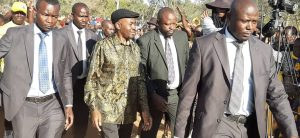
CCC president Nelson Chamisa leaving Sakubva Sports Oval at his last star rally in Mutare recently.
The million-dollar question at the moment is who is the ‘favourite’ to be the next President of Zimbabwe? Judging from the attendance crowds at star rallies covered by Easterntimeszim, it is more of a CCC versus Zanu-PF fight. Will this turn out to literally end as the proverbial David versus Goliath tale in every aspect or end as another so far so close sobbing story for opposition politics in Zimbabwean elections, often marred by intimidation, violence as well as vote rigging speculations? These remain the questions on every Zimbabwean’s mind as the watershed harmonized elections draw closer.
These are the second harmonized elections under the 2nd Republic, following the overthrowing of the late President Robert Mugabe, and the second run for presidency between Chamisa and President Mnangagwa. In the 2018 elections President Mnangagwa won 50.8 percent of the vote against Chamisa’s 44.3 percent, giving him the majority that was needed to avoid a runoff. The MDC Alliance however disputed the results through the Constitutional court but to no avail. It was the closest since 2008 that an opposition party had come to breaking Zanu-PF’s 37-years hold on power.
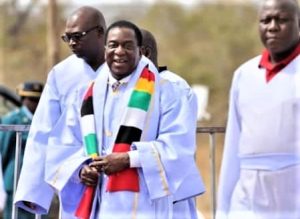
President Emmerson Mnangagwa at Johanne the 5th of Africa International Church recently.
At his final star rally in Mutare held recently on August 6, the ‘small boy’, as Chamisa is popularly known, a name that came from being ridiculed by Zanu-PF devotees as literally being too young to run for office, calling him a boy still sucking milk from his mother’s breast, on the contrary talked like a calf that has just grown horns to become a fierce bull. The 45-years old CCC leader who is slightly just above half the age of 80-years old President Mnangagwa said his time has come and no one can steal his thunder this time round.
With a large following of thousands that filled the Sakubva Sports Oval arena, he showed why he is the main opposition rival above all the other 10 opposition candidates running for President, all aspiring to topple the ruling Zanu-PF party reign since 1980 when the country attained its independence.
The wave of change and ascendancy to power by opposition parties has grown in Southern Africa with Malawi and Zambia being the torch bearers of where a peaceful transfer of power has been seen. In 2020, the leader of the opposition Malawi Congress Party (MCP), Lazarus Chakwera, won against the ruling Democratic Progressive Party (DPP) President Peter Mutharika, a historic feat which saw an opposition party winning elections for the first time since the country gained independence in 1964. The following year in 2021, Zambia followed Malawi’s path, when opposition leader Hakainde Hichilema led the United Party for National Development (UPND) to a surprise electoral victory over the ruling Patriotic Front (PF) party that was led by Edgar Lungu.
However, on the contrast, in Zimbabwe as well as neighbouring South Africa and Mozambique, the revolutionary parties seem to be still maintaining a tight grip. Nonetheless, in the last decade the Southern Africa Development Community (SADC) region has evidently been slowly experiencing a turn in politics as opposition parties are gaining power which was unheard of before in the region.
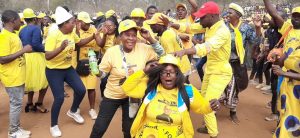
CCC supporters at the last star rally in Mutare celebrating and proudly wore their regalia without fear.
In SADC, elections have been dominated by the liberation parties that came to power after independence. But now the region is slowly experiencing a paradigm shift as Judiciary systems are now taking a more impartial role in ensuring free and fair elections among parties. This is the hope and prayer of all contesting opposition parties in Zimbabwe, amidst concerns already arising of reported cases where political violence is perpetrated by some alleged Zanu-PF henchmen but no arrests or prosecution are made.
“Zanu-PF captured the MDC party and thought this would be my downfall, not knowing this actually became a blessing in disguise as God wanted us to start a new party. God wanted to bless me with new things, start my reign with a new party, new regalia and new leadership. In 2018 Mnangagwa (President) survived by a whisker and won through the Concourt (Constitutional Court) but not this time because we are going to vote big and win with an undisputed margin,” said Chamisa during his final Mutare star rally as he is hoping to carve his own history for his political party which was launched last year on 24 January.
Adding, “During the March 2023 by-elections we won majority of the seats in the council and parliamentary seats. We won 19 out of the 28 national assembly seats and won 75 seats in 122 municipalities, so what does that tell you? We are the next government… However, any democracy needs a political system where the opposition can effectively win elections and come to power peacefully. Failing this, democratic consolidation cannot be achieved,” said Chamisa referring to the need for impartiality by state institutions such as ZEC, the judiciary and law enforcement agencies during the elections cycle.
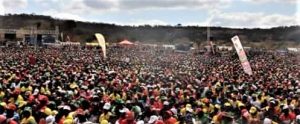
The Zanu-PF star rally in Mashonaland East which drew thousands of supporters.
Regardless of accusations of busing supporters to record earth shattering crowds during star rallies, the ruling Zanu-PF is however also proving to be no push-over with President Mnangagwa also saying that victory is inevitable. However, the fact that at first when CCC launched in January 2022, Zanu-PF scoffed it as a ‘nonentity’ but now it has changed its reprise recognising CCC as the main opposition, speaks volumes about the dynamics of politics ahead of the 2023 watershed elections next week Wednesday.
With 11 aspiring Presidential candidates that successfully submitted their papers and were approved during the nomination court in July, most however have evidently struggled to draw large crowds of supporters during the campaign rallies countrywide. Longstanding parties like the Movement for Democratic Change (MDC-T) now under Douglas Mwonzora and Lovemore Madhuku’s National Constitutional Assembly (NCA) have been finding the waters to be extremely turbulent this time round with a handful of supporters attending their campaign rallies.
This prompted Mwonzora to withdraw from the race last week Tuesday, but ZEC said constitutionally it is not possible any more as the ballot papers had already been finalized. As part of the reasons for his withdrawal, Mwonzora complained that ZEC refused to accept nomination papers for 87 of the party’s candidates for the National Assembly, meaning that even if he won the presidency, he would not have control of parliament. He however said the MDC-T’s 24 constituency candidates who successfully filed nomination papers will still participate in the election.
Political analyst Andy Ziyera believes the political hand in Zimbabwe has been slowly changing and it is now increasingly becoming unpredictable where the pendulum will swing towards. “At first it was the 2009 Government of National Unity (GNU) which was a learning curve that change was possible and the first precursor that Zanu-PF could be toppled though the polls or pressured into power sharing. Then there was the unexpected November 2017 coup that ended the late President Mugabe’s 37 years reign. And in 2018, Chamisa under the MDC Alliance narrowly lost his first presidential election but contested the results through the courts to no avail. These are all signs,” said Ziyera.
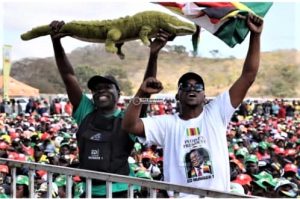
Zanu-PF supporters raising up a crocodile mascot, a symbol associated with President Mnangagwa nicknamed the crocodile or ngwena.
Chamisa who has on several occasions in his political career been thrown into the lions den and came out unscathed believes victory is written on the walls as his destiny. Whilst on the other hand a cunning predator better known as the crocodile, President Mnangagwa, has also proven to be a cat with nine lives. After surviving the dramatic attempted assassination escape from the claws of the late Mugabe in 2017 through the Mozambique Forbes border in Mutare, he too believes it’s his time to lead and carve his own history after being in the political shadows of his predecessor for so long.
Chamisa criticizes Zanu-PF leadership for being responsible for Zimbabwe’s economic woes that saw the country recording the highest inflation rate in the world, forcing millions of Zimbabweans to migrate abroad for better employment opportunities just to escape poverty. This is President Mnangagwa’s biggest challenge that he has to face in persuading Zimbabweans for a second term, despite having some notable developmental achievements since taking office in 2018, including repealing some retrogressive Acts that were highly condemned such as the Access to Information and Protection of Privacy Act (AIPPA) and the Indigenization and Economic Empowerment Act which required foreign companies to cede 51 percent of their shares to locals. Civil society critics however believe more could have been done if he had dealt with corruption once and for all as well as bureaucratic and lethargic tendencies on implementation of developmental projects by government.
Zimbabwe initially had 12 presidential candidates but independent candidate and former Zanu-PF political commissar as well as cabinet member and Minister, Saviour Kasukuwere was barred by the High Court and Supreme Court.
The others are Madhuku of the NCA, Trust Chikohora of the Zimbabwe Coalition for Peace and Development, FreeZim Congress leader Joseph Makamba Busha, Zimbabwe Partnership for Prosperity leader Blessing Kasiyamhuru, National People’s Congress leader Wilbert Mubaiwa, United African National Council president Gwinyai Henry Muzorewa, Peter Harry Wilson of the Democratic Opposition Party and the only woman, Elisabeth Valerio of the Democratic Union of Zimbabwe.


